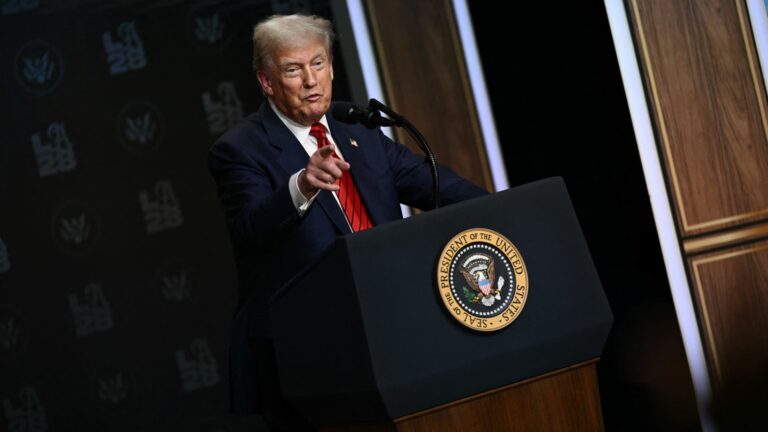Key Points
U.S. President Donald Trump is hailing a win after the European Union vowed to invest an additional $600 billion in the U.S. — although it’s unclear if the bloc can materialize its pledge. Asked in a Tuesday interview with CNBC what could happen if the EU fails to honor its commitment, Trump said, “Then they pay tariffs at 35%. No, no. They brought down their tariffs, so they paid $600 billion and because of that, I reduced their tariffs from 30% down to 15%.” The investment pledge is part of the July trade deal between the two partners which includes 15% tariffs on EU goods, as well as an agreement for increased investment and the purchase of $750 billion worth of U.S. energy. Describing the investment as a “gift,” Trump told CNBC on Tuesday that the EU “gave us $600 billion that we can invest in anything we want.” For its part, the European Commission noted in a breakdown of the partners’ trade agreement that “EU companies have expressed interest in investing at least $600 billion (ca. €550 billion) in various sectors in the US by 2029.” A spokesperson for the EU told CNBC that the European Commission had reached out to EU industries and sectors to establish their U.S. investment intentions. “On this basis, the EU Commission was able to present a coherent, non-binding commitment to the US on estimated EU investment in the coming years,” they said. What could the investment look like? So far, the only detail that is certain amid the EU’s pledge to invest is that the private sector will be footing the bill. Alberto Rizzi, policy fellow at the European Council on Foreign Relations, told CNBC that the investment could effectively be made in any industry in the U.S. “But looking at recent trends manufacturing, finance, chemicals and tech are the most likely areas of investment,” he said, noting that the final recipients of the funds will ultimately depend on the decisions of individual companies. Other potential areas— in which Trump might also like to see increased investment — include autos, pharmaceuticals and aircraft, said William Reinsch, senior adviser and Scholl Chair emeritus with the Economics Program at the Center for Strategic and International Studies. Looking at a potential timeline, Reinsch noted that “these things always move slower than expected.” “The policy uncertainty Trump’s actions have generated will slow down the decision making process even more. Making a multi-million dollar investment is not a decision made lightly. Companies have to assure themselves that the long term economics are favorable,” he told CNBC by email. Notably, the 2029 target timeframe flagged by the EU also coincides with the end of Trump’s presidential term, after which the U.S.’ trade and tariffs regime is unknown. Will it happen? It remains to be seen whether the investment will be made, especially as the EU does not have the power to force businesses to follow through with their plans. “The investment pledge of the EU … is much more smoke and mirrors than a binding commitment,” Rizzi commented. “The EU Commission has no power to bind member states on this, and, with the exception of state-owned firms, capitals cannot coerce their national companies’ choices either.” Arthur Leichthammer, policy fellow for geo-economics at the Jacques Delors Centre, likewise said that, while the $600 billion “is not wildly unrealistic in economic terms,” the EU’s inability to enforce investment makes it a tricky pledge. “The number is not incredibly unrealistic but the EU’s ability to credibly commit to it is limited,” he told CNBC. As for Trump’s suggestion of potentially higher tariffs if the investment does not materialize? “That’s exactly the risk,” Leichthammer said, suggesting that the EU’s pledges have given Trump leverage to add further pressure or even threaten to call off the trade deal further down the line. “It shows that this is not a one-off agreement but the beginning of an ongoing, transactional process, which Trump can escalate at any point. The ‘deal’, which is more of a political announcement, bought time, but no lasting stability,” he said. — CNBC’s Silvia Amaro contributed to this report.

